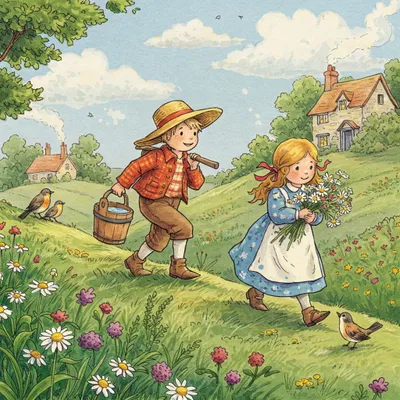Jack and Jill

Lyrics
To fetch a pail of water.
Jack fell down and broke his crown,
And Jill came tumbling after.
Up Jack got, and home did trot,
As fast as he could caper,
He went to bed to mend his head,
With vinegar and brown paper.
Jill came in and she did grin
To see his paper plaster;
Mother, vex’d, did whip her next
For causing Jack's disaster.
History and Meaning
Although the nursery rhyme Jack and Jill was published in 1765, it was already a well known kids song for perhaps a hundred years or more. The rhyming of the words 'water' and 'after' hint that the rhyme dates back to the 1600s, when they were pronounced as 'wahter' and 'ahter'.
In the original London publication Jill was actually known as 'Gill', which was a common boys name at the time. At this point the rhyme was made up of only the first verse. By 1806 it had increased to 15 versus, including some with child's mother 'Old Dame Gill'. The character 'Gill' was updated to 'Jill' to make it clear there was both a girl and a boy.
So what does it mean?
Wells are typically found in low lying areas which are closer to the water table and would require less digging, and water naturally flows downhill. So why would Jack and Jill go 'up the hill' to find one? It could be a metaphor for their innocence, or perhaps a satire of a political leader making a poorly considered decision.
The well could have been a 'dew pond', which is an artificial method of collecting rainwater in high lying areas. These were recorded in use as far back as the 9th Century in England.
Jack's 'crown' was the top of his head, rather than a royal crown.
What was Jack doing with Vinegar and Brown Paper?
A plaster made from vinegar and brown paper plaster was used to treat cuts and scrapes at the time. That Jack was left to care for a broken head in such a fashion makes us appreciate modern medicine all the more!